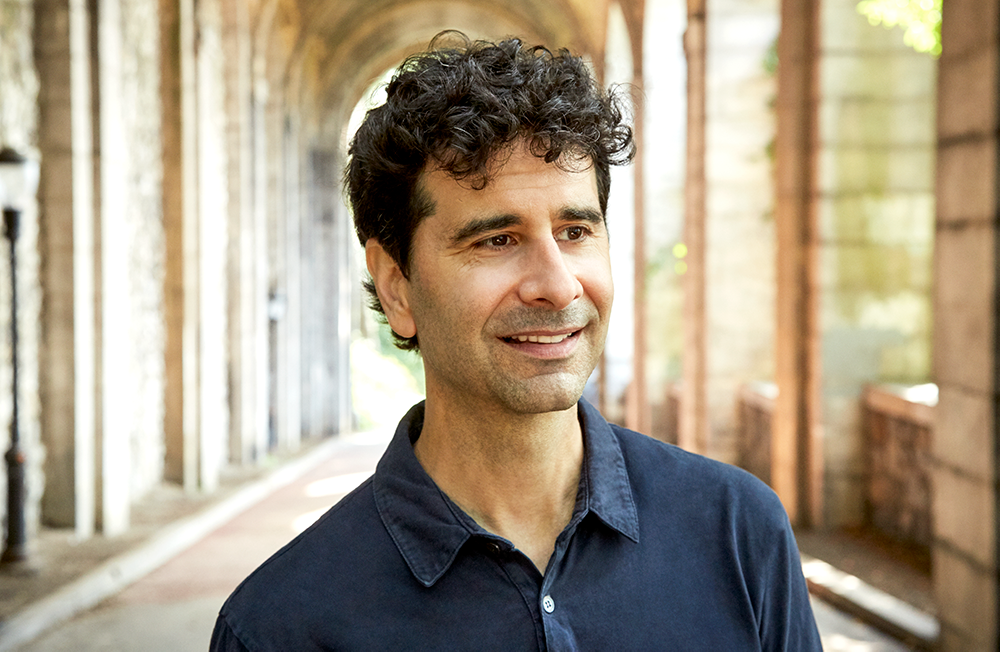
Now it holds such brilliance in my memory: a sold-out theater, everyone laughing, no masks hiding the smiles, all these gales of gladness gusting between the actors and their audience. I suppose we felt giddy before we even arrived. There’d been a huge ice storm and outside the trees had been abracadabra’d into glass, the whole world in spangles under the streetlamps. Timing matters here: It was the second Sunday in February, a month before the country buckled under the pandemic. We were so merry, so unaware of the grief, anger and uncertainty to come, the fire after the ice.
The theater was Maine’s Portland Stage. And the play was Almost, Maine, written by John Cariani ’91, who is also a Tony-nominated actor: he has co-starred in Broadway’s Fiddler on the Roof, Something Rotten and The Band’s Visit. If you’ve raised a high schooler over the past decade, you’ve likely heard of Almost, Maine. In 2017–18, it was the most produced play in North American high schools, knocking A Midsummer Night’s Dream out of the top spot. It has thrived at regional theaters as well, with 6,000 productions since its 2004 premiere. The show has been performed, in translation, in some 20 countries, from South Korea to Brazil to the United Arab Emirates. The play’s imagery needs no translation, though: a couple on a bench, in winter, gazing up at the pines and the stars.
Maine is celebrating its bicentennial this year, and this revival was supposed to help jumpstart things, with the added luster of the playwright starring in his own work. Since it was pre-COVID, it became one of the few bicentennial events to actually take place in person. The show’s a good choice to shoulder that distinction, though. Because Almost, Maine says so much about this corner of the country and about rural life in general, when such stories have become rare in the theater world.
Strung together as nine short plays—romantic, funny, poignant, with generous helpings of magical realism—it’s set in the fictional town of Almost. It’s TV’s Northern Exposure meets Neil Simon’s Plaza Suite (if the suite were a snowfield) meets a Gabriel García Márquez novel meets Shakespeare’s The Winter’s Tale, which features the famous stage direction, “Exit, pursued by a bear.”
The action takes place, to quote my program, “on a cold, clear, moonless, slightly surreal Friday night in the middle of the deepest part of a Northern Maine winter.” There are 19 roles in all, but on this night four actors took them on. Various couples find they are smitten or not, with witty physical comedy along the way. When two men suddenly find they’ve fallen in love, for instance, they literally fall onto the stage. Repeatedly.
I marked in my notebook whenever the audience erupted, and you can see when I was laughing too hard to make my scrawls legible. Like when one character, a chipper bartender, announces the night’s liquor promotion: “Free drinks if you’re sad!” Or when another deadpans, “I’m heading south for the winter.” Pause. “To Vermont.” Or when two snowmobilers realize their feelings have pushed past friendship. This leads to a striptease, which is comically protracted in a place where one must dress in layers. Cariani and fellow actor Samantha Rosentrater laboriously fling gloves, hats, snow boots, down jackets, down overalls, sweaters, fleece vests and flannel shirts, all the way, finally, to their long underwear.
Granted, there’s a you-had-to-be-there quality to describing comedy. And Almost, Maine got almost mean reviews in Manhattan. Success came later, and elsewhere. As Anita Stewart, executive and artistic director of Portland Stage, wrote in the program: “After being spurned by a cynical New York, Almost, Maine blossomed away from the big cities.” Indeed. There in our seats, just in from the ice storm, with our own bulky winter wear bunched behind us, the play charmed and validated.
Not just me, someone who has lived in New England for decades and has had a bear lope through her yard often enough, but the real Mainers I quizzed at intermission. One loved the characters’ gripes about how far you have to drive to get to a store, a school, a hospital. “Everything in Maine is 45 minutes away,” he explained ruefully. Mary Bonney, one of Cariani’s best high school friends, was there with her husband and young sons. The boys grinned and said their favorite part was watching those guys pratfall onstage. Said their mom: “Every time I’ve seen this play, it’s like going home.”



